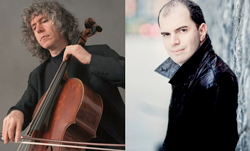by Daniel Hathaway

Here was the ground plan: both of Brahms’s cello sonatas, early and late, introduced by short pieces by Bartók and Busoni based on folk music and separated by two of Liszt’s late cello arrangements of his earlier songs. Liszt the revolutionary and Brahms the conservative didn’t get along at all during their lifetimes, but seemed as happily at ease with their proximity here as did Gerstein’s high-tech tablet computer (no page turner needed!) and Isserlis’s retro, gut-wound cello strings.
Béla Bartók’s first rhapsody opened the program with the vitality of Hungarian folk tunes and rhythms, a fine marriage of country fiddling with classical chamber music. Isserlis’s signature mane of grey, curly hair got as much of a workout as his Stradivarius as he dramatically acted out the mercurial moods — now dramatic, now playful — of this two-movement, fast-slow piece. Seemingly entranced when he plays, Isserlis stares at the ceiling, then at the floor, then off into the distance. Gerstein was his completely equal partner, playing with colorful clarity and precision and carefully controlling his dynamics so the open-lidded piano never overbalanced the cello.
Ferruccio Busoni’s first teaching job in Helsinki won him a Finnish wife and put him in touch with regional folk music. His Ten Short Variations on ‘Kultaselle’ gave Isserlis and Gerstein nine minutes of intense, harmonically and contrapuntally sophisticated material to work with and they delivered splendidly. One of the performers’ most endearing qualities is their amazing dynamic range, which explores all levels from whispering pianissimos to resonant fortissimos. And those gut-wound strings under Isserlis’s bow produce a wonderful, singing tone without the nasal stridency that steel-strung cellos can produce at times in the hands of others.
Johannes Brahms’s sonatas opus 38 (1862-1865) and opus 99 (1886) ended each half of the program, offering a fascinating look at the evolution of a composer between his early 30s and early 50s. The early, e minor work sounded graceful and expressive in Isserlis and Gerstein’s understated, transparent performance. The later, F Major piece had (like Brahms!) gained weight and taken on more of the rhythmic and textural complexity we associate with his later style, and cellist and pianist pointed up these differences without allowing the music to become hefty. One alleged piece of connective tissue between the two is the rejected Adagio of opus 38 which seems to have been retooled for the second movement of opus 99. That movement’s affecting qualities lingered for a long moment at the end, where Isserlis sustained his final note for a delicious, fading eternity.
Liszt’s arrangements of Romance oubliée and Die Zelle in Nonnenwerth date from the early 1880s, reworkings for cello and piano of songs he wrote in the early 1840s. These delightful, tiny vignettes followed the lengthy intermission and caught Liszt in two very intimate moods. Die Zelle was particularly attractive, beginning with a sweet and tender solo for the cello.
After the second Brahms came a long and enthusiastic ovation and the first and last speech of the evening by Steven Isserlis. Expressing the wish that he could still count on having the energy that Brahms did at that age (which is next year for the cellist!), he announced an encore: Schubert’s song Nacht und Träume, apologizing that his instrument wasn’t capable of singing the words. No matter. Isserlis was supremely eloquent, sans paroles.
Published on ClevelandClassical.com January 30, 2013
Click here for a printable version of this article.



